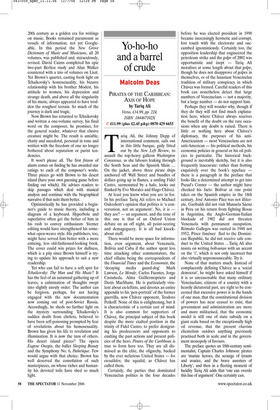Yo-ho-ho and a barrel of crude
Malcolm Deas
PIRATES OF THE CARIBBEAN: AXIS OF HOPE by Tariq Ali Verso, £14.99, pp. 224, ISBN 184467102X ✆ £11.99 (plus £2.45 p&p) 0870 429 6655 Tariq Ali, the Johnny Depp of international comment, sails out in this little barque, gaily fitted out by the New Left Review, to assault the top-heavy galleon Washington Consensus, as she labours leaking through the South Seas and the Spanish Main ... On the jacket, above three pirate ships anchored off Wall Street and bundles of dollars going up in flames, a smiling Fidel Castro, surmounted by a halo, looks out flanked by Evo Morales and Hugo Chávez.
At least you know what you are in for. In his preface Tariq Ali refers to Michael Oakeshott’s opinion that politics is ‘a conversation, not an argument’. No, it is they are? — an argument, and the tone of this one is that of an Oxford Union debate on an off night, all point-scoring and demagoguery. It is all bad knockabout stuff.
There would be more space for information, even argument, about Venezuela, Bolivia and Cuba if the author spent less time attacking other commentators, the chief villains being the correspondents of the Financial Times and the Economist, the ‘decaying media guard-dog’ Mark Lawson, Le Monde, Carlos Fuentes, Jorge Castañeda, Alma Guillermoprieto and Denis MacShane. He is particularly virulent about ex-leftists, and devotes an entire appendix to his ‘pen-portrait’ of the former guerrilla, now Chávez opponent, Teodoro Petkoff. None of this is enlightening, but it is characteristic of a certain cast of mind. It is also common for supporters of Chávez, the principal subject of this book despite the more exalted position in the trinity of Fidel Castro, to prefer denigrating his predecessors and opponents to exalting the past actions and present policies of the hero. Pirates of the Caribbean is true to form here too. They are all dismissed as the elite, the oligarchy, backed by the ever nefarious United States — los escuálidos, the squalid, as Chávez has called them.
Certainly, the parties that dominated Venezuelan politics in the four decades before he was elected president in 1998 became increasingly hermetic and corrupt, lost touch with the electorate and succumbed ignominiously. Certainly too, the opposition leadership that engineered the petroleum strike and the golpe of 2002 was opportunistic and inept — Tariq Ali moralises at some length about that golpe, though he does not disapprove of golpes in themselves, or of the luxuriant Venezuelan tradition of military conspiracy in which Chávez was formed. Careful readers of this book can nonetheless detect that large numbers of Venezuelans — not a majority, but a large number — do not support him.
Perhaps they will wonder why, though if they do they will not find much explanation here, where Chávez always receives the benefit of the doubt on the rare occasions when any doubt is raised. There is little or nothing here about Chávez’s diplomacy, the purposes of his antiAmericanism — most Venezuelans are not anti-American — his political methods, his economic policies in general or his oil policies in particular. The historical background is inevitably sketchy, but it is also frequently inaccurate: rather than fretting exquisitely over the book’s typeface there is a paragraph in the preface that looks like a determined attempt to get into Pseud’s Corner — the author might have checked his facts: Bolívar at one point takes on the Spanish empire in the 18th century, José Antonio Páez was not illiterate, Garibaldi did not visit Manuela Sáenz in Peru on his return from fighting Rosas in Argentina, the Anglo-German-Italian blockade of 1902 did not threaten Venezuela with permanent occupation, Rómulo Gallegos was ousted in 1948 not 1952, Pérez Jiménez fled to the Dominican Republic, he did not receive safe conduct to the United States ...Tariq Ali also insists on writing bolívarian with an accent on the ‘i’, which is not only incorrect but also virtually unpronounceable. Try it.
None of that matters much. Instead of complacently defining Chávez as a ‘social democrat’, he might have asked himself if it is so unreasonable that many ordinary Venezuelans, citizens of a country with a heavily dictatorial past, are right to be concerned that excessive power is in the hands of one man, that the constitutional division of powers has near ceased to exist, that government and administration are more and more militarised, that the economic model is still one of state subsidy on a giant scale based on the exceptionally high oil revenue, that the present chavista clientelism outdoes anything previously practised both in scale and in the government monopoly of favours.
The preface quotes an 18th-century sentimentalist, Captain Charles Johnson: pirates are ‘marine heroes, the scourge of tyrants and avarice, and the brave asserters of Liberty’, and then in a fleeting moment of lucidity Tariq Ali adds that ‘one can overdo this line of argument’. One certainly can.


































































































 Previous page
Previous page